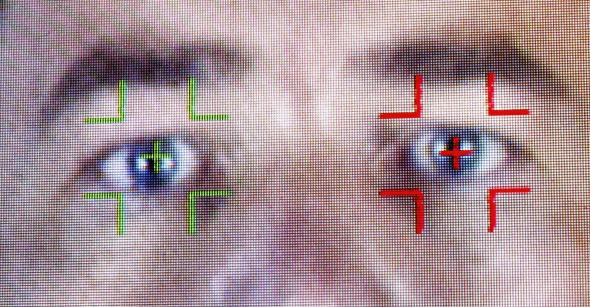The Vermont Department of Motor Vehicles landed in hot water Wednesday after a report alleging it used biometric facial recognition software to aid law enforcement investigations in defiance of state statutes.
The American Civil Liberties Union of Vermont was the first to sound the alarm. According to a Wednesday press release, the nonpartisan advocacy organization “obtained internal Department of Motor Vehicles records describing a DMV facial recognition program that is banned by Vermont state law and compromises the privacy and security of thousands of Vermonters.” It also delivered a letter to Vermont DMV Commissioner Robert Ide on Tuesday calling for “an immediate end to the program,” which the ACLU of Vermont says has operated since 2012. The organization obtained the documents through a 2016 public records request.
Facial recognition software scans photographs—in this case, those found on 2.6 million Vermonters’ drivers’ licenses—to create a searchable database of individuals’ likenesses. The Vermont DMV wasn’t completely hiding the program—in fact, the department website directly references it beneath an “Enforcement & Safety” tab. The site claims that the DMV “uses facial recognition technology as part of our ongoing effort to prevent individuals from obtaining multiple licenses or Non-Driver ID cards.” But Title 23 of the Vermont Statutes has barred the DMV from “implement[ing] any procedures or processes for identifying applicants for licenses, learner permits, or nondriver identification cards that involve the use of biometric identifiers” since 2005.
The DMV may not have represented the program accurately, however. A frequently asked questions section on the department’s site states that “only specially trained DMV employees have access” to individual Vermonters’ biometric data, adding that “we carefully protect all the data associated with your DMV record, including your facial image and its facial recognition template.” But the ACLU of Vermont alleges that the DMV used its biometric database to analyze Vermont drivers’ license photos in response to ID requests from law enforcement agencies on at least 126 separate occasions, providing matched images and “any associated information stored with the photo” to entities including the FBI, Immigration and Customs Enforcement, the U.S. State Department, and local and state police departments from around the country.
The documents show no evidence that the DMV ever rejected a law enforcement request, according to the ACLU of Vermont’s press release. “DMV’s records show most requests do not include a warrant or other indicator of probable cause or valid investigation,” the advocacy organization’s statement continues. “DMV does not take steps to ensure the information provided is protected from further distribution and provides no notice to the individuals targeted.” Furthermore, a document dated June 2013 includes a statement from the DMV’s director of enforcement saying that as many as one-third of people referred to requesting law enforcement agencies on fraud charges based on the biometric program were later exonerated.
DMV Commissioner Ide disputed the ACLU’s account of the program and defended its legality on Wednesday, the Burlington Free Press reported. Ide claims that the DMV did deny requests to comply with law enforcement investigations but that it simply didn’t document those instances. “I think there’s an indication [in the ACLU’s letter] that the facial recognition system is used much more extensively than it is,” he added. “We think we are using the facial recognition system as the legislature intended it to be used.”
As the Verge reported last August, 43 states—minus California, Missouri, Louisiana, Mississippi, Maine, New Hampshire, and of course Vermont—have empowered DMVs to employ biometric scanning to tamp down on things like license fraud. The ACLU’s press release suggested that the DMV’s facial recognition program often targeted innocent Vermonters.
According to the Verge, the 2005 REAL ID Act, a realization of identification statutes recommended by the 9/11 Commission Report, mandated the digital storage of state drivers’ licenses. The law also offered federal cash as an incentive for states to experiment with ways to reduce identity fraud, prompting a spate of state legislatures voting to legalize facial recognition software. The FBI has for years maintained a gargantuan in-house facial recognition database which, thanks to sharing with local and state law enforcement biometric databases, likely includes half of all American adults.
As with many other tactics and technologies used by law enforcement, the DMV’s biometric identification tool also disproportionately affects people of color. The ACLU of Vermont noted that black Vermonters’ drivers license photos were seven times more likely to be targeted in the database than those of white Vermonters, and Hispanic residents were 12 times as likely to be searched for. “In addition to violating Vermont law, DMV’s facial recognition program invades Vermonters’ privacy, disproportionately targets people of color, places immigrants at increased risk of harm, and lacks due process protections to prevent further abuse,” the organization’s statement quoted James Lyall, its executive director, as saying. “This program was banned for a reason, and must be halted immediately.”
